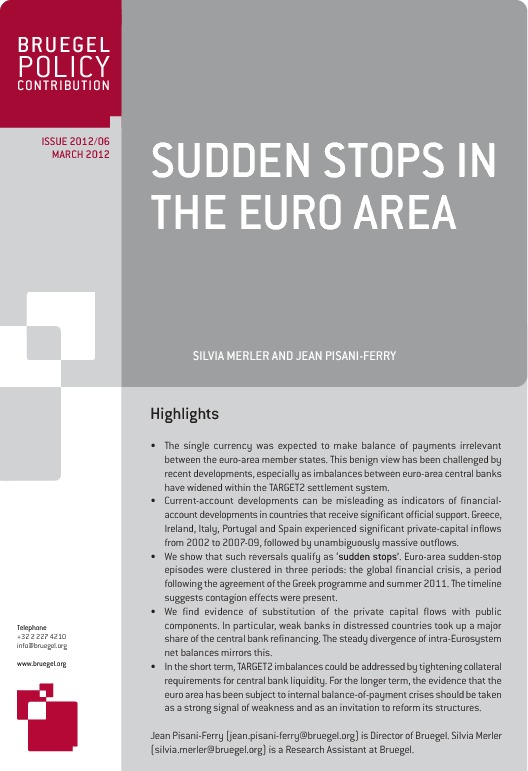Policy Contribution
Sudden stops in the euro area
There is a view that the euro crisis is a balance-of-payments crisis at least as much as a fiscal crisis.The balance-of-payments discussion lacks clarity, however. First, it seems awkward to speak of balance-of-payments crises within a monetary union that was designed to make such crises impossible. Second, few of the proponents of the balance-of-payments crisis view have substantiated their claims with clear evidence. Unlike a standard balance-of-payments crisis, within the euro area, current-account deficits have adjusted partially and slowly. Third, the relationship between TARGET2 balances and balance-of payment imbalances remains confused. The purpose of this paper is to fill these gaps.
The single currency was expected to make balance of payments irrelevant between the euro-area member states. This benign view has been challenged by recent developments, especially as imbalances between euro-area central banks have widened within the TARGET2 settlement system.
Current-account developments can be misleading as indicators of financial account developments in countries that receive significant official support. Greece, Ireland, Italy, Portugal and Spain experienced significant private-capital inflows from 2002 to 2007-09, followed by unambiguously massive outflows.
We show that such reversals qualify as ‘sudden stops’. Euro-area sudden-stop episodes were clustered in three periods: the global financial crisis, a period following the agreement of the Greek programme and summer 2011. The timeline suggests contagion effects were present.
We find evidence of substitution of the private capital flows with public components. In particular, weak banks in distressed countries took up a major share of the central bank refinancing. The steady divergence of intra Eurosystem net balances mirrors this.
In the short term, TARGET2 imbalances could be addressed by tightening collateral requirements for central bank liquidity. For the longer term, the evidence that the euro area has been subject to internal balance-of-payment crises should be taken as a strong signal of weakness and as an invitation to reform its structures.








